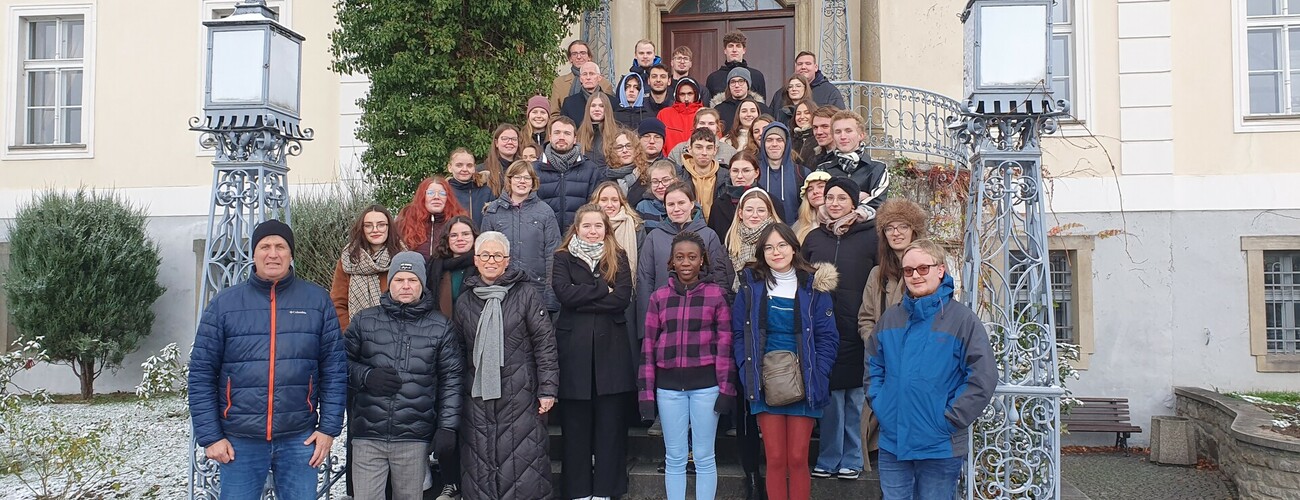
The Polish-French-German Student Colloquium has been held annually since 1990 in accordance with the principle of trilateral rotation of venues. This year, our University was the main organizer with financial support from the Vice-Rector for Student Affairs and the Dean of the Faculty of Humanities. Close to 50 students of German studies from Angers and Vechta, as well as members of the Germanica academic circle and English studies from Zielona Góra, spent five interesting days in Krzyżowa at the International Youth Meeting Center - Krzyżowa Foundation for Mutual Understanding, and two days in Berlin - the organizational part of the stay was also the responsibility of the University of Vechta (Germany).
The entire stay had a working character, as usual, but at the same time, it was enriched with activities to give our Colloquium the appropriate setting.
The theme of the 31st International Colloquium: "Youth in Resistance to National Socialism" was chosen with the two mentioned places and their historical significance in mind. The palace in Krzyżowa was owned by the von Moltke family until the 1940s. The memory of the so-called Krzyżowa Circle, an important link in the resistance movement against the Nazi regime in Germany, is currently maintained by the Krzyżowa Foundation and the International Youth Meeting Centre. Participants of our Colloquium were able to learn more about the oppositional attitudes and resistance of the young generation to the Nazi regime.
The last two days spent in Berlin also served to delve into this topic. Visits to the German Resistance Memorial Center and the Silent Heroes Memorial Center were significant in the program. These centers were established at the site of the failed coup of July 20, 1944, and the execution of Stauffenberg and three other officers. They are dedicated to presenting open resistance against the unjust regime on one hand, and visualizing silent resistance, somewhat clandestinely, on the other.
The theme for this year was formulated a year in advance, allowing for the gathering and preparation of materials and texts as the basis for further work (totaling 30 hours during the meeting) in four international thematic groups (each group composed of representatives from partner universities: University of Zielona Góra, Universität Vechta, and Université d’Angers).
In order to enable all participants to form an appropriate assessment of the recent history of our part of Europe, the focus was initially on reading documents that provided insight into the ideological, socio-political aspects of National Socialism on one hand, and the humanistic and progressive reasoning of the resistance movement members on the other. These were mainly excerpts from speeches, transcripts of conversations, letters, writings, flyers, etc. The opposition of young people had its roots in religious or political worldviews, in the environment, in the genesis of youth movements, and in youthful protest against the older generation. Therefore, during the Colloquium, examples of non-conformist behaviors were discussed in four groups.
The students' stay in Krzyżowa, where the famous Krzyżowa Circle was formed, also influenced their work. Dr. Dominik Kretschmann, director of the Krzyżowa Memorial Place of the Krzyżowa Foundation, guided the participants through this historical site and explained the motives, program, and goals of the resistance movement. This lecture provided participants with insight into the conspiratorial realities of the Circle and the threats its members had to face.
Dr. Robert Żurek, director of the European Academy and board member of the Krzyżowa Foundation, delivered a lecture titled "Poland and Europe. About the past and present of complex relationships" in Wrocław - where the participants spent one day. Referring to the activities of the Foundation, he spoke about significant European political initiatives in Polish history and related them to the present - also in a lively dialogue with students.
During the colloquium, there were also visits to characteristic places in the visited cities, namely Wrocław and Berlin.
According to tradition, more information about this year's Colloquium will soon be found in the next issue of the Academic Community's Monthly.
Photographs: private archive


